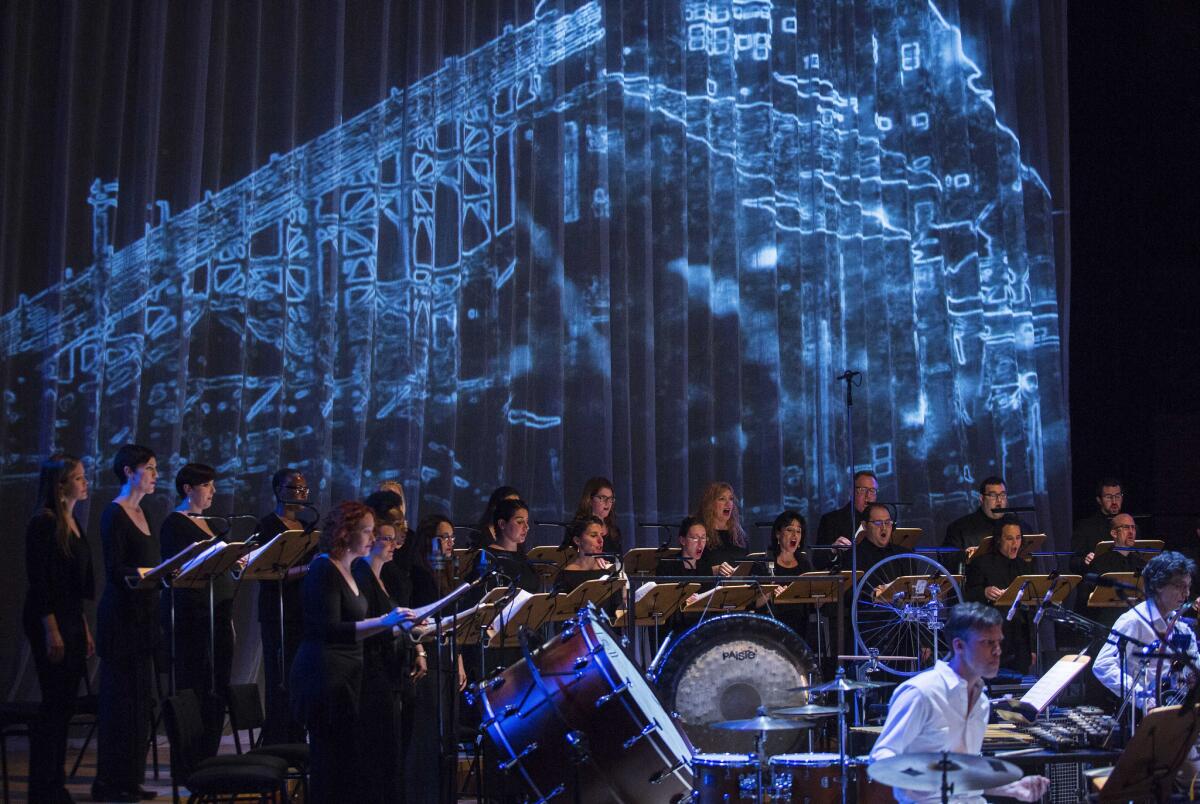Review: West Coast premiere of ‘Anthracite Fields’ by L.A. Master Chorale mines the depths of American music

The Los Angeles Master Chorale performs “Anthracite Fields: Music of the Coal Miner” at Walt Disney Concert Hall on Sunday night.
- Share via
However surprisingly, the old-fashioned oratorio has survived into the 21st century as an American musical medium just as apt for confronting our moral and social issues as it was for Handel in his time.
Since 2000 alone, we’ve had John Adams’ “El Niño” and “The Gospel According to the Other Mary,” along with Osvaldo Golijov’s “La Pasión Según San Marcos.” These offer not only the multitudinous context to the significance and necessity of immigration, but they also offer the receptive listener something of the scope of the experience.
Now comes Julia Wolfe’s “Anthracite Fields,” given its West Coast premiere by the Los Angeles Master Chorale on Sunday night at Walt Disney Concert Hall. If you haven’t yet heard the news, this is a riveting, up-to-date oratorio concerning early 20th century mine workers that gives powerful expression to the consequences of labor and the American labor movement.
See more of Entertainment’s top stories on Facebook >>
Premiered by a 150-member chorus, the Mendelssohn Club, in Philadelphia in 2014, “Anthracite Fields” was then a highlight of the New York Philharmonic’s Biennial. It won a Pulitzer Prize. (Disclosure: I was on the jury.) A recording released last year was a nominee for a Grammy (it was expected to win but didn’t — that’s the Grammys for you).
A founding member of the Bang on a Can composer collective, Wolfe wrote the instrumental parts for the rocking Bang on a Can All-Stars sextet. She also made a version for smaller chorus, which was used in the New York premiere and on the recording. That was Master Chorale music director Grant Gershon’s choice for the Disney premiere because it offers greater clarity to the text.
That text is a startling starting point for startling music about the lives of coal miners in the Appalachian Mountains in the late 19th and early 20th centuries. Wolfe begins with a chanted litany of names taken from a massive index of mining accidents, brilliantly signifying the magnitude of calamity by selecting some 350 names beginning with John and having a single-syllable last name.
Wolfe’s inspiration is that dirge transforms, with a post-Minimalist beat, into near-ecstatic celebration. The mine workers are not victims but uncelebrated heroes. Breaker boys, exploited children who pick filter debris from coal shoots with bare hands, are celebrated as well. Folk songs and children’s songs are modernized. Still innocent, able to hope, kids turn hardship into exalted, captivating play.
A speech to the House Labor subcommittee by labor leader John L. Lewis, sung as a rock ballad by Bang on a Can electric guitarist Mark Stewart (cellist Ashley Bathgate was able vocalist for “Breaker Boys”), restored the high-minded eloquence we now hunger for in Congress. You and I, Lewis reminded us and Stewart sang with moving pathos, benefit from industrial machines “that grind up human flesh and bones” so we might life in comfort.

Artistic director Grant Gershon conducts the Los Angeles Master Chorale in Julia Wolfe’s “Anthracite Fields: Music of the Coal Miner.”
We who benefit from their services, Lewis proclaimed, “owe protection to those men ... and security to their families if they die.” But the families must find beauty on their own, and the Appalachians supply that with flowers, named in number in lyrical, folk-inspired section for chorus.
The ending is a rhythmically bounding inventory of benefits to modern living through coal: Bake a cake, heat your house, test your blood, watch a movie, ride a subway, boil some water, call your girlfriend on the phone. We can’t live any other way, as Wolfe’s music happily outlines and restates, growing increasingly complex, activities overlapping with repetition. The Johns gave their well-being and their lives for us, and now we are overwhelmed by it all, and conveniences multiply.
The Master Chorale sang with magnificence and gripping feeling. Gershon found a rich range of expression that the performance I heard in New York and the one recorded by Julian Wachner and the Choir of Trinity Wall Street only implied. Historical video projections of miners and artful uses of the texts by Jeff Sugg on a curtain behind the singers were sensitively handled.
Gershon further set the scene by beginning the program with a series of a cappella spirituals and songs from the “The Sacred Harp” of American shape-note 19th century folk music. The spirituals were of special significance because the miner experience is typically told from the point of view of European immigrants, forgetting that African Americans also worked the mines. Happily no one who heard the restrained rapture that Master Chorale soprano Zanaida Robles brought to “Wade in the Water” will forget it.
Finally, the All Stars cooked like only the All Stars can cook, and their sound crew made them sound great at all times. However, amplifying voices in Disney is a job for experts in this acoustically volatile hall. Wolfe’s music stirringly gives every John his day, but this time sonic muck mushed the Johns’ names together.
I wonder whether the full, unamplified Master Chorale might not have made a greater impression. It would be worth a try, given that the single performance of so meaningful a work is not sufficient. And maybe that would be an excuse for a second recording, given how much meaning Gershon has to bring to what the “Anthracite Fields” means to modern American music and modern America.
More to Read
The biggest entertainment stories
Get our big stories about Hollywood, film, television, music, arts, culture and more right in your inbox as soon as they publish.
You may occasionally receive promotional content from the Los Angeles Times.











